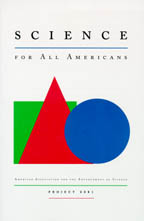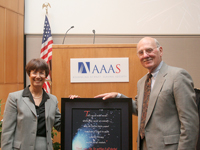
-
Science for All Americans
Science for All Americans at 20
Reflections on the book that paved the way for
science education standards
"There are no valid reasons—intellectual, social, or economic—why the United States cannot transform its schools to make scientific literacy possible for all students. What is required is national commitment, determination, and a willingness to work together toward common goals. We trust that Science for All Americans clarifies those goals.”
—Science for All Americans, 1989
Calls for national education standards and for improving science education have been making headlines this summer. In June, the National Governors Association and the Council of Chief State School Officers launched an effort to create national standards in K-12 English and mathematics. Also that month, a new report from the Carnegie Corporation of New York urged the nation to transform mathematics and science education through common standards, high-quality assessment, improved teaching and teacher training, and redesigned schools and systems.
On the legislative front, U.S. Senator Chris Dodd (D–CT) and U.S. Representative Vernon Ehlers (R–MI) reintroduced their SPEAK Act (“Standards to Provide Educational Achievement for All Kids”), which encourages states to adopt national science standards set by the National Assessment Governing Board.
AAAS officials have also been busy this summer advocating on behalf of voluntary national science standards and the consistency they would bring to science teaching and learning (see related article in this issue).
A Coherent Vision
Here at AAAS Project 2061, the national dialogue on the next steps for science education reform has had particular relevance as we mark the 20th anniversary of Science for All Americans this year. Published in 1989, the book’s coherent explanation of science literacy was hailed as an important first step on the road to improving K-12 science education. Indeed, it paved the way for ambitious national standards in science for all students and was a major influence on science frameworks in many states. Translated into Chinese, Japanese, and Spanish, Science for All Americans influences reform efforts abroad as well.

-
Dr. Jo Ellen Roseman,
director of Project 2061,
and Dr. F. James Rutherford,
founder of Project 2061
What lessons can Science for All Americans offer educators and policymakers today? Just how far have we come since the late 1980s? In the essays that follow, F. James Rutherford, Project 2061’s founder, and Jo Ellen Roseman, Project 2061’s director, offer timely insights into the book’s origins and its pioneering definition of what constitutes science literacy.
Dr. Rutherford shares “a brief rendition of the Science for All Americans story—how it got started, how it was produced, what it turned out to be.”
Dr. Roseman, writing in NSTA Reports, looks at how Science for All Americans led to Project 2061’s Benchmarks for Science Literacy and the conceptual strand maps in Atlas of Science Literacy. She reminds us that “What truly set Science for All Americans apart was its emphasis on the interconnectedness of knowledge.”
To read these reflections on Science for All Americans, click on the titles below:
“The Birth of Science for All Americans” [PDF, 42.5KB]
Dr. F. James Rutherford
Founder, Project 2061
"Science for All Americans: Timely or Timeless?” [PDF, 283KB]
NSTA Reports, March 2009
Dr. Jo Ellen Roseman
Director, Project 2061
Send Us Your Science Literacy Stories
Whether you are a new science teacher hearing the Science for All Americans story for the first time or an educator who has long put Project 2061’s resources to work, we would love to hear your ideas, reminiscences, and questions about Science for All Americans, Project 2061, or where the science standards movement should go from here.
Send your comments to Cathy Tramontana. We will feature the responses in a future issue of Project 2061 Connections.
Read Science for All Americans free online or order the book.
# # #
For more information about Project 2061 and Science for All Americans, please contact the authors:
Director: Dr. Jo Ellen Roseman, (202) 326-6752
Founder of Project 2061: F. James Rutherford
Also in the July/August 2009 issue:




